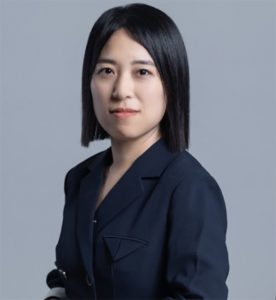by Paige Bjerke
IMS Written Communications Assistant
Dr. Hailin Fu graduated in 2012 from Nanjing University with a bachelor’s degree in chemistry before pursuing a Ph.D. in Polymer Chemistry through the Polymer Program at the UConn Institute of Materials Science. She completed her Ph.D. in 2018.
In September of 2024, after conducting postdoctoral research at both the University of California, Berkeley, and Eindhoven University in the Netherlands, Fu began work as an Assistant Professor at Westlake University in Hangzhou, China.
IMS News reached out to Professor Fu with a few questions about where her educational and research journeys have taken her so far, and how she hopes to apply what she has learned going forward.

IMS News: Your educational journey was taken all around the world. From receiving your Bachelor’s in your home country of China, to earning your Ph.D. at UConn, to conducting postdoctoral research in both California and the Netherlands. What benefits did you derive from studying in such a wide variety of locations?
Fu: It gave me opportunities to think about things from different points of view and to break some stereotypical thoughts. I experienced different styles of learning, working, research, and life. The more places I went, the more I reflected on what kind of person I wanted to be. At UConn, I found my passion for outdoor activities and gained confidence and curiosity through exploring different fields of science.
IMS News: Much of your recent and ongoing research seems to involve the relationship between supramolecular polymers and water. What compelled you to study this and what have you discovered so far?
Fu: Water and supramolecular polymers are important components of life. Some good examples are cytoskeletons in cells and fibers in muscles. I’m compelled to study supramolecular polymers and water for my keen interest in life.
We discovered the liquid-liquid phase separation (LLPS) phenomenon of synthetic supramolecular polymers, which is somehow ignored or left out by the supramolecular polymer field. Supramolecular polymers can form into tactoids and arrange themselves in a highly ordered way in the solution through LLPS, opening possibilities for a range of new materials, from nanoscopic soft matter to highly structured aqueous solutions. The new discovery also applies to the liquid crystalline field. It serves as the magnified analog to small molecule liquid crystals and introduces more chemical diversity and tunability compared to biomolecular filament-based liquid crystals.
IMS News: Where can we see concepts from your current research in everyday life, and which industries would you hope to see applying your research in the future?
Fu: The formation of liquid droplets in vinegar and oil is a typical example of the liquid-liquid phase separation phenomenon. Water can also form into liquid droplets in the presence of some macromolecules. Lots of liquid droplets (also called “membraneless organelles”) in cells are considered to be formed by the LLPS of proteins, including DNA and RNA. Like macromolecules, supramolecular polymers can drive the LLPS of water. The phase separated state of supramolecular polymers may also be related to liquid crystals formed by rod-like filaments like amyloid fibrils, microtubules, cellulose, etc.
We think this phenomenon may help generate ordered and dynamic materials with long-range orders. Considering the noncovalent nature of supramolecular polymers, high chemical diversity through modular stacking, high tunability with stimuli response, and high recyclability can be achieved simultaneously. It may be used to generate biomaterials that can interact with cells in a dynamic and responsive way. Combining functions and long-range order together, it also has the potential to be used to make optoelectronic materials with better performance.
IMS News: I read that you decided to go to the Netherlands after encouragement from UConn Professor Yao Lin. What advice do you have for prospective Ph.D. students on building this high level of trust with their professors?
Fu: I would say communication is the most important thing. Besides the weekly individual meetings, which are at least one hour long, Prof. Yao Lin and I had many other discussions. Encouraged by continued feedback and conversations, I started to be more open in asking questions or sharing concerns. Trust is built gradually through years-long interactions. Prof. Yao Lin had visited the Netherlands during his sabbatical and shared his experience in our chats. This made his suggestion quite convincing.
IMS News: You recently started a new position as an Assistant Professor at Westlake University in China. Why were you drawn to a career in education, and what do you hope to accomplish in this new role?
Fu: This new role combines both education and research. As the beneficiary of education, especially from the tutoring of my Ph.D. advisor and postdoctoral advisors, I’ve grown into a better person, and I hope to do the same for other people through education. I’d also love to work with young and creative minds to challenge new possibilities and discover new things in research. As an assistant professor, I hope to build a well-functioning and well-managed lab, do some fun and unique research, and help students to achieve success in their careers.